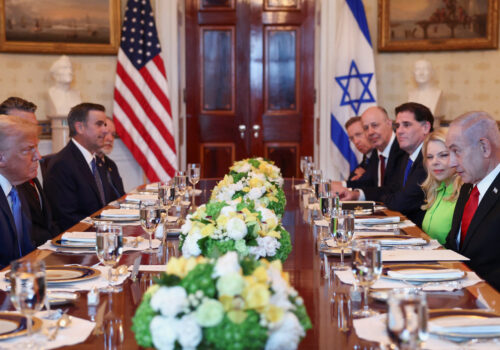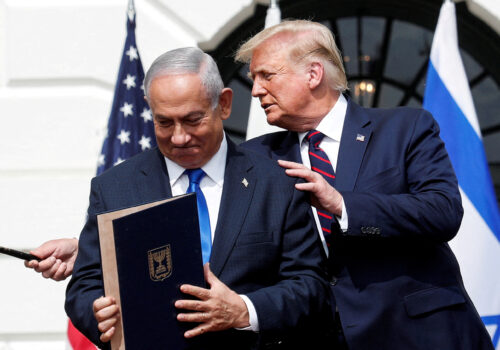Diplomatic momentum for recognizing a State of Palestine is growing. Here’s what to know.
They’re making a statement. In recent days, France, the United Kingdom, Canada, Portugal, and several other countries have said they may soon recognize a State of Palestine at the United Nations (UN)—which would put them alongside more than 140 other nations across the globe. These decisions are shaped by the ongoing war and humanitarian crisis in Gaza, as well as by domestic political considerations. They also stand to affect relations with Israel and the United States, which do not recognize a Palestinian state. Below, Atlantic Council experts tour several countries to map out why these efforts are taking off now, how they are being received, and what to expect next.
Click to jump to:
New momentum to recognize

France
French President Emmanuel Macron’s decision to pledge recognition of a Palestinian state at the upcoming UN General Assembly in September took many observers, in and outside of France, by surprise. Only a few weeks earlier, Macron had cautiously articulated a vision that conditioned such recognition on demands that included the exclusion of Hamas from Palestinian politics. Several factors can explain this sudden shift. Domestically, Macron leads a minority centrist government, and the far-left opposition has long called for such recognition. However, Macron’s statement is unlikely to ease French politics, which are today less about the Israel-Palestine conflict than the approval of a contentious new government bill.
Frustration with the Netanyahu government over the prolongation of the Gaza war also influenced the French decision. However, there have been minimal punitive measures (yet) taken against Israel, be it at the French or the European Union level. Ultimately, the decision reflects Macron’s leadership: It is a gamble taken on a whim and meant to challenge the status quo—i.e. the two-state solution inherited from the defunct Oslo process. Macron surely believes that it also allows France to play a leading role as a bridge between Western powers and the “Global South.” At first sight, the fact that Arab states such as Saudi Arabia, Egypt, and Qatar, as well as NATO allies such as the United Kingdom and Canada, are rallying to the French call gives credence to Macron’s gamble. But the momentum could peter out. Without support from the United States, without consultation with Israel, and without clarity on the territorial and political contours of such a Palestinian state, a French recognition will sadly be a mere rhetorical exercise.
—Jean-Loup Samaan is a nonresident senior fellow at the Atlantic Council’s Scowcroft Middle East Security Initiative. He previously served as a policy analyst at the Directorate for Strategic Affairs of the French Ministry of Defense.
***
France’s decision to recognize a Palestinian state in September, is driven by its assessment that achieving a two-state solution “is in mortal danger.” As the war in Gaza nears its two-year mark, and the Israeli colonization of the West Bank is speeding up supported by violent settlers, the possibility of a Palestinian state seems increasingly unattainable. France sees a “strategic breakdown in regional balance” that is leading to unjustifiable security and humanitarian consequences throughout the Middle East, and it is choosing to act. Complementing US efforts to establish a quick cease-fire, France believes this move can carve out space for durable political options over the long term.
Recognition comes along with a diplomatic process, which France and Saudi Arabia jointly proposed at a July 28 UN conference. Both countries are seeking to achieve wide-ranging support at the September UN General Assembly for a resolution outlining “tangible, time-bound, and irreversible steps” toward implementing a two-state solution. The co-sponsored resolution, which has received support from all countries in the Arab League, includes the disarmament and exclusion of Hamas from any future in the governance of Palestine and the Israeli withdrawal from the Gaza Strip.
The move is about international legacy for Macron as a Palestinian state has already been recognized by a majority of UN member states. It also has a domestic dimension, as the Israeli-Palestinian conflict has heavy consequences on the political scene in France.
—Léonie Allard is a visiting fellow at the Atlantic Council’s Europe Center, currently in residence from the French Ministry of Armed Forces.
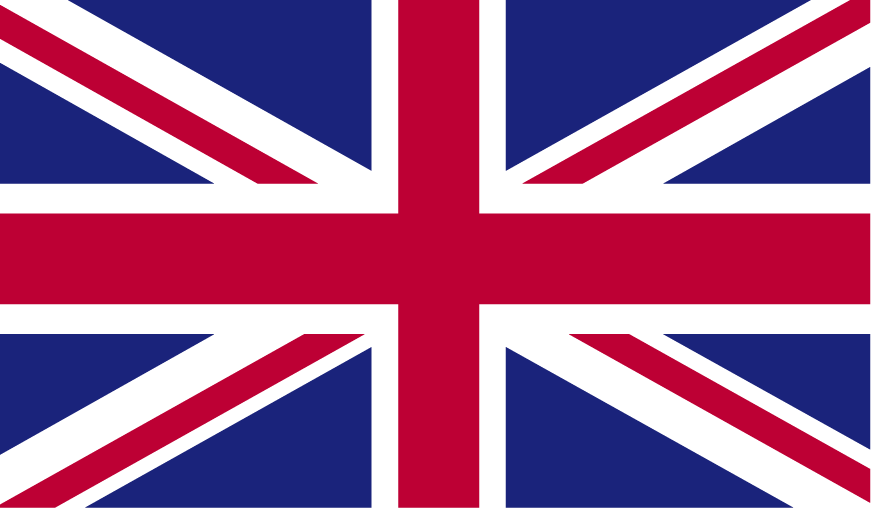
The United Kingdom
Prime Minister Keir Starmer’s recognition of a Palestinian state (unless Israel makes an unexpected radical policy change) is a major turn in British foreign policy. Pressure from his party and public opinion has been growing in recent months for the United Kingdom to do more to save lives in the short term and help set conditions for a sustainable post-conflict political settlement. The immediate trigger for the change was the onset of famine in Gaza and the need to get Israel to think again about its approach. But France’s decision to recognize also affected the calculation of when and how the British voice should weigh in. The conditionality of the recognition was a way to align also with US goals as stated by President Donald Trump.
Critics of the change say it is rewarding Hamas and is empty gesture politics. Starmer has made clear, however, that he sees no future for Hamas in governing Gaza. The historic and diplomatic significance of the step is far from empty. The Palestinians see this as a historic step that goes some way to balancing the Balfour Declaration, which was seen as paving the way to the Israeli state, and therefore giving the United Kingdom more influence as a peacemaker. By joining other global and European powers as well as the Arab states, the United Kingdom creates a more substantial building block for a US president to seek a comprehensive deal between Israel, the Palestinians, and both the Middle East and European neighborhoods. Starmer will continue to face challenges at home to control immigration and boost growth, but he is likely to boost his reputation as a prudent custodian of the United Kingdom’s national interest.
—Jon Wilks is a distinguished fellow at the Atlantic Council and leads the Rafik Hariri Center’s Transatlantic Program, strengthening US and European dialogue and collaboration on Middle East issues. He served for thirty-four years in the British Diplomatic Service, from 1989 to 2023, and he was British ambassador to Qatar, Iraq, Oman, and Yemen, as well as special envoy to Syria.
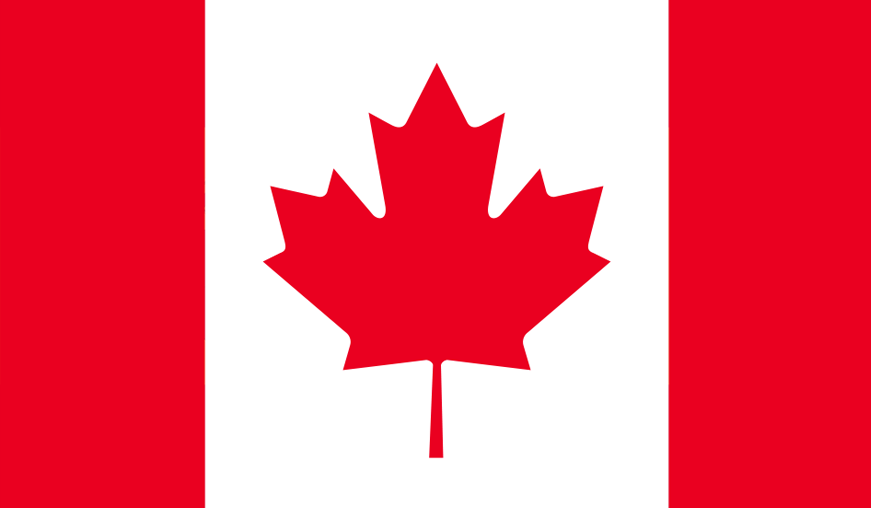
Canada
Much like Starmer, Canadian Prime Minister Mark Carney has been driven by domestic political pressure and deeply rooted national values to make a dramatic foreign policy shift: recognizing Palestinian statehood. Canada now joins the overwhelming majority of UN member states that have already taken this step.
What Ottawa likely did not anticipate was Trump reaching for his favorite tool—tariff threats—as diplomatic punishment for upsetting Washington’s close ally, Israel. Yet, this reaction fits with Canada’s broader reorientation of its foreign policy. Under Carney, Ottawa is looking less southward to Washington and more toward Europe and other global partners—his first foreign trip as prime minister was to Europe, not DC, a move that speaks volumes.
Canada’s recognition of Palestine was not unconditional. Ottawa sensibly tied it to major reforms, including a requirement for Palestinian Authority President Mahmoud Abbas to hold general elections by next year, to exclude Hamas, and to pursue demilitarization. Canada also pledged financial support to the Palestinian Authority to improve governance—though given the Authority’s reputation for corruption and detachment from its people, success is far from guaranteed.
In the broader context, this decision could embolden moderates on both the Israeli and Palestinian sides. Some pundits argue that Carney’s move was purely ethical—pointing to the humanitarian catastrophe in Gaza and Canada’s opposition to policies that perpetuate famine and suffering. (Canada was one of the first Group of Seven nations to recognize Joseph Stalin’s forced famine, or Holodomor, of 1932-33 and create a national annual memorial day.) But there’s likely a domestic political calculation as well. Canada’s fast-growing Arab population, estimated around 100,000, has increasing sway in swing constituencies, and that electoral reality cannot be ignored.
—Michael Bociurkiw is a nonresident senior fellow at the Atlantic Council’s Eurasia Center.
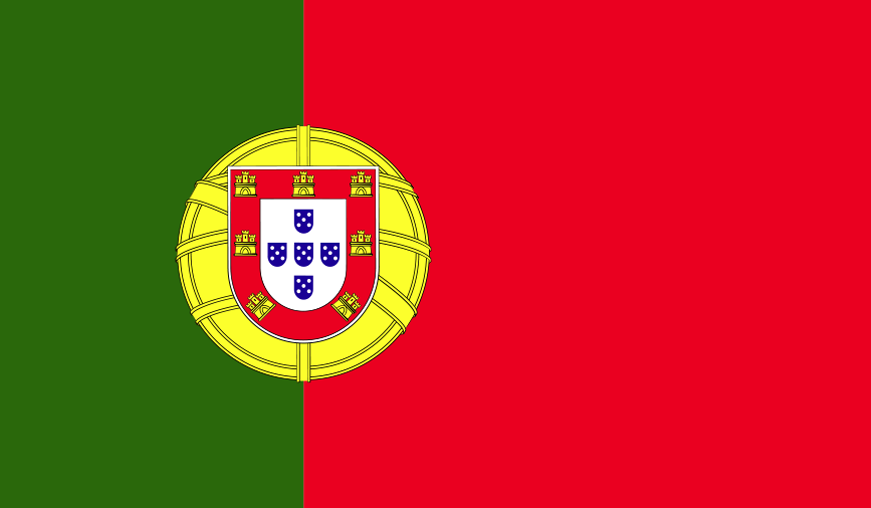
Portugal
The Portuguese government’s announcement that it would join the growing list of Western nations considering recognition of a Palestinian state marked a somewhat surprising evolution in Portuguese foreign policy. While stating it has always favored a two-state solution, Portugal in the near past felt its recognition of Palestine would be marginally consequential to any long-term solution to the conflict. The country also typically prefers to not highlight itself on such a controversial issue. While the humanitarian crisis in Gaza is certainly a motivating factor, persuasive negotiations from the French and British in New York at the UN were more likely stronger factors to nudge the Portuguese opinion.
Prime Minister Luís Montenegro’s strategy—especially listing ambitious preconditions, hearing opinions from President Marcelo Rebelo de Sousa and the major political parties, and waiting to decide until September with other like-minded nations—still leaves him plenty of maneuvering room in case the spotlight becomes too hot for his liking.
—Andrew Bernard is a nonresident senior fellow with the Atlantic Council’s Europe Center.
No new plans to recognize
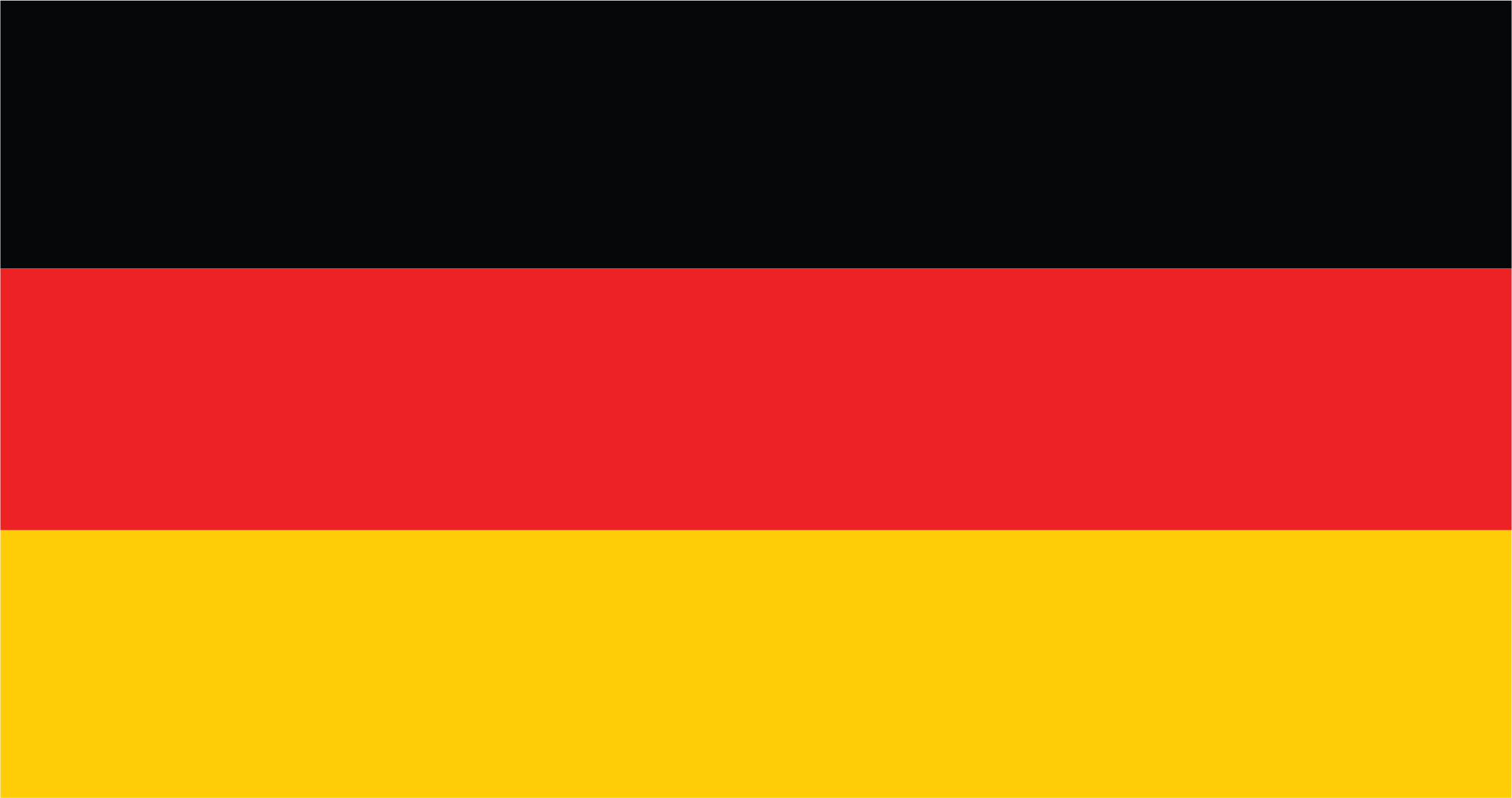
Germany
Unlike France, Germany is not planning on recognizing a Palestinian state at the upcoming UN General Assembly in September.
On Thursday, German Foreign Minister Johann Wadephul said that such recognition should only come “at the end of” a two-state-solution process. He added, however, that “a negotiated two-state solution remains the only path that can offer people on both sides a life in peace, security, and dignity,” and that this process should start at once. These comments came while en route to Israel, but also on the heels of mounting European pressure following the French and British moves toward recognition.
Chancellor Friedrich Merz is also facing increased pressure at home, particularly from the center-left junior coalition partner, the Social Democratic Party, which has openly questioned Germany’s unwavering support for Israel. Merz is even facing pressure from the German public, where three in four people believe their country should “exert more pressure on Israel.” As one of Israel’s staunchest allies, Germany is in a tough spot. While recognition isn’t imminent, Germany could potentially speed up its timeline, but that decision mostly rests on what Israel does in the coming weeks and months.
—Rachel Rizzo is a nonresident senior fellow at the Europe Center.
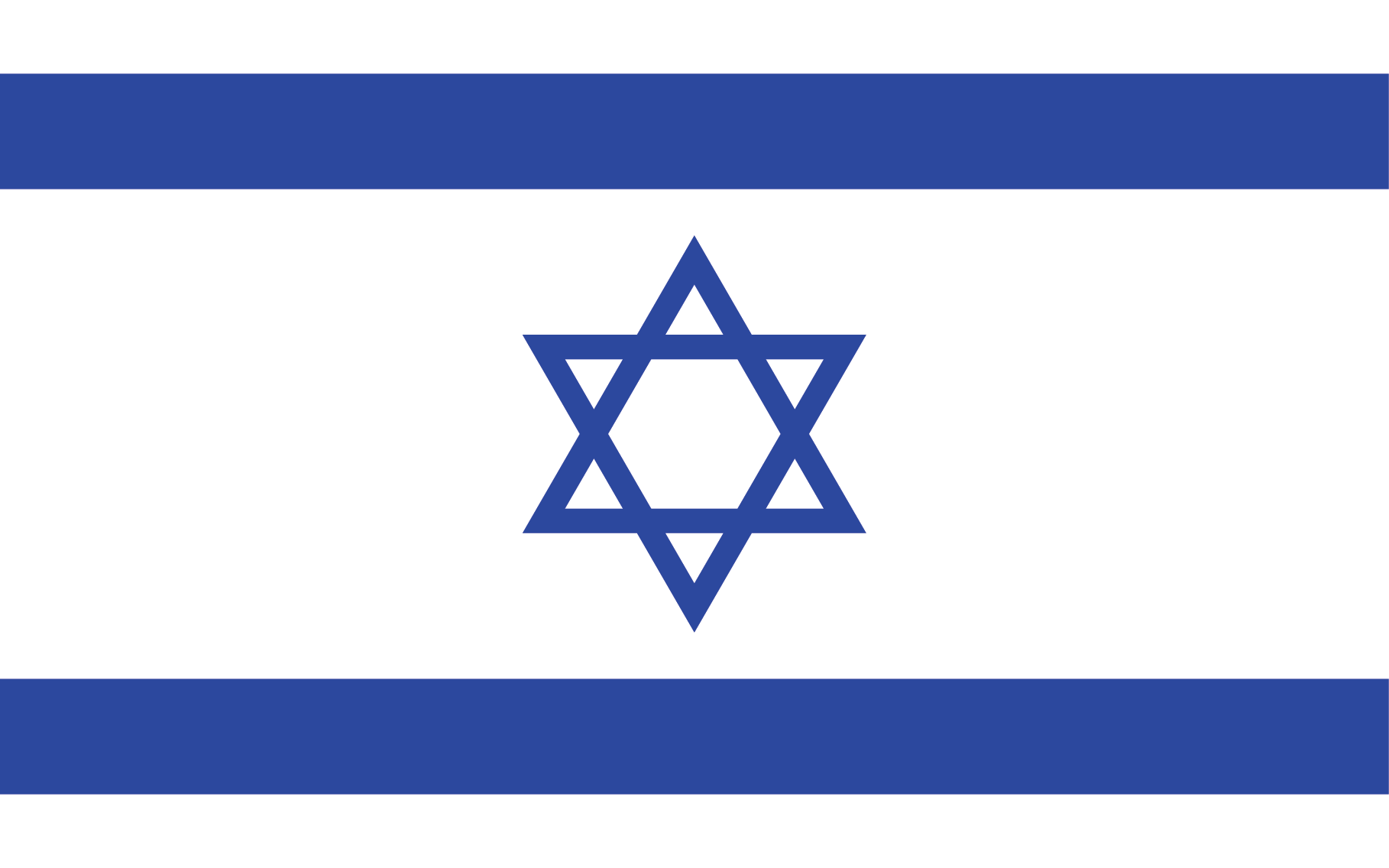
Israel
Israelis are mostly united—supporters and detractors of the Netanyahu government alike—in the perception that any moves to recognize Palestinian statehood at this juncture would constitute a counter-productive prize to the loathsome perpetrators and celebrants of the carnage wrought by Hamas and its accomplices on October 7, 2023.
While they are divided deeply on questions regarding their own government’s prosecution of the war in Gaza and its level of culpability in the continued failure to secure freedom for the remaining fifty hostages being held captive there, Israelis harbor no doubts about Hamas’s primary responsibility for the fate of the captives and for the plight of the Palestinians under its (weakened) control. According to this thinking, this week’s statements of intent by Macron, Starmer, and others—if not fully surprising, given prevailing sentiments and circumstances—will only serve to complicate efforts toward a diplomatic solution, by incentivizing Hamas to stiffen its conditions for an agreement with an increasingly defensive Israel, while having only very limited impact on the actual situation in the territory, where Israeli forces remain deployed extensively.
Eyes in Jerusalem will continue to be focused on Washington, where Trump is pushing back against these designs to accept Palestinian sovereignty and, thus far, withstanding pressure to impose any resolution on Prime Minister Benjamin Netanyahu. Any change in that White House perspective could, if it came, compel a similar reevaluation of Israel’s strategy as well.
—Shalom Lipner is a nonresident senior fellow at the Atlantic Council’s Scowcroft Middle East Security Initiative who previously worked in foreign policy and public diplomacy during his time at the Prime Minister’s Office in Jerusalem, where he served in the administrations of seven consecutive Israeli premiers.
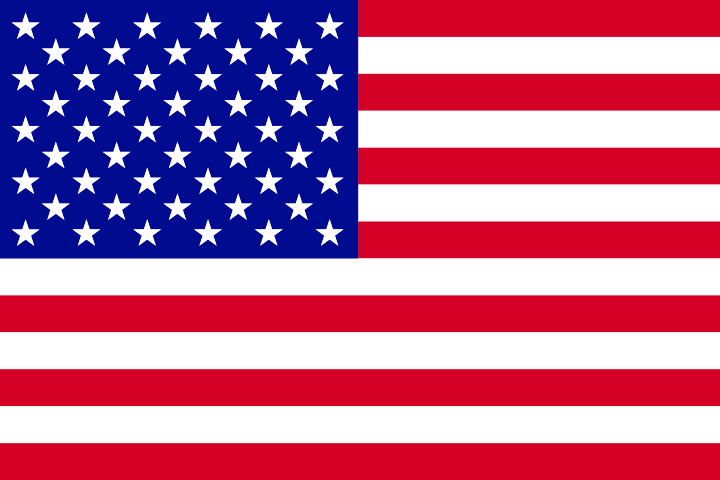
The United States
Trump has indicated that he shares the Israeli outlook on France and the United Kingdom’s expressed intent to recognize a Palestinian state. “You could make the case that you’re . . . rewarding Hamas if you do that,” Trump said. “I don’t think they should be rewarded. I’m not in that camp, to be honest.”
That’s an understandable position, as far as it goes. The European recognitions will have no impact on the actual establishment of a Palestinian state. That can only come about through negotiations between Israel and the Palestinian Authority. While there needs to be a plan to achieve a Palestinian state that lives alongside a secure Israel, its achievement is a long way off. However it comes about, it should not be allowed to be seen as a win for the terrorist organization that conducted the October 7 attack.
But it cannot be denied that these recognitions are a direct result of Israel’s failure to articulate any plausible day-after plan for Gaza. The Biden administration’s efforts to define the security, governance, and humanitarian aspects of such a plan got little traction. Trump made it worse by offering up his proposal to build a Gaza “Riviera,” which extremist ministers in the Israeli cabinet took as license to pursue their vision of reoccupying Gaza, emptying it of its Palestinian residents, returning Israeli settlers, and annexing it to Israel. That plan is a dead letter, widely rejected across the region, and is a recipe for more dead hostages, more dead Palestinian civilians, more dead Israeli soldiers, increased isolation of Israel, and no positive involvement by Arab states in Gaza’s future.
Trump has an opportunity, with his rejection of the recognition announcements coinciding with the starvation crisis in Gaza, to turn in a new direction. In addition to pushing for a massive humanitarian aid surge, he should shift to working with Israel on an agreement to end the war and gain the release of all hostages, with a follow-up plan to work with Arab states on the exile of remaining Hamas leaders and fighters, the deployment of an Arab security force, and the introduction of alternative Palestinian leadership prepared to live in peace with Israel.
—Daniel B. Shapiro is a distinguished fellow with the Atlantic Council’s Scowcroft Middle East Security Initiative. He served as US ambassador to Israel from 2011 to 2017, and most recently as deputy assistant secretary of defense for Middle East policy. He also previously served as the director of the Atlantic Council’s N7 Initiative.
Further reading
Tue, Jul 29, 2025
‘I can barely stand or make it through the day’: First-hand views of Gaza’s starvation
MENASource By Arwa Damon
Israel has systematically denied aid entry into Gaza, and perpetuated false narratives intended to discredit the humanitarian community.
Sat, Jul 12, 2025
Netanyahu’s trip to Washington ends with conflicting signals
MENASource By Daniel B. Shapiro
The moment of truth may yet come when Trump’s leverage on Netanyahu, which is considerable, may not be expressed only in private settings.
Thu, Jul 3, 2025
Three Abraham Accords goals Trump should raise with Netanyahu
MENASource By Allison Minor
Between Iran and Gaza, Trump and Netanyahu will have a full agenda during the latter’s visit to Washington.
Image: Portugal's Minister of State and Foreign Affairs Paulo Rangel addresses during a High-level International Conference for the Peaceful Settlement of the Question of Palestine and the Implementation of the Two-State Solution at U.N headquarters in New York City, U.S., July 29, 2025. REUTERS/Eduardo Munoz

